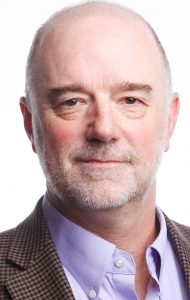Kamala Harris and I both were born in October 1964, which means we have no living memories of Martin Luther King Jr., the moon landing or the Vietnam War. According to most dividing lines, we were born in the last three months of the Baby Boom.
I don’t know about her, but I’ve never identified with Boomers because I don’t remember the things that shaped that generation.
Here, however, are some things that shaped those of us who are the oldest of the X-ers.

Chris Caldwell
We came of age in a time of backlash. Busing was coming into full swing, which you can see in the much larger number of Black kids visible in my third grade class picture than in my second grade class picture. We have no memories of the Civil Rights era, but we were teenagers when Ronald Reagan spoke of “welfare queens,” and we were finishing college when George Bush ran the Willie Horton ad.
We don’t remember the radicals of the 1960s, but we were in college during the Act Up protests by gay rights activists, and the AIDS pandemic was one of the first crises we faced as adults. Not unrelated to this was the birth of cable TV, which we saw emerge as older teens. All this made us the first generation to grow up without the option of social or cultural insularity.
This era of being a cultural and global open book picked up steam in our college years, where we had a front-row seat to the birth of the internet. Kamala Harris and I learned to type on typewriters in high school, but by the end of college, all of us were doing papers on personal computers and were beginning to search other networked college libraries using Gopher and other primitive search engines. Laptops and cell phones, however, were not yet a thing. And at my college, Facebook, was — wait for it — a book, on paper. “Face Book” was the name of the student phonebook that included photos of all students.
In other words, we came into adulthood at the birth of the information age. Our peers have reacted in different ways to that experience, some with open minds and some with closed minds. But one thing we have in common is this: We are all full-minded.
“We may not have wisdom, but we have never lacked knowledge or information.”
We may not have wisdom, but we have never lacked knowledge or information. We didn’t come of age in the wired world of our kids, but we’re the bridge between them and the generation that read print newspapers on the train to work.
Exodus 1:8 tells of a new king in Egypt “who did not know Joseph,” which brings me to one final point. We 1964-ers are the last of the line who had World War II era bosses. As we came into the workplace, they were just about to retire and many had a strong mentor’s mindset.
I don’t know her story, but I’d be willing to bet there were some World War II veterans in her family or at work who shaped her thinking as a young adult. I once shared a room at a retreat with one such mentor, whose shouting woke me up when he had a nightmare about the war. Experiences like this are why our enthusiasm for worldwide connectivity is appropriately tempered by our adult connections with those who knew the horrors of world-wide war.
Biden has rightly spoken of himself as a generational bridge, but those of us about to turn 60 can be bridgebuilders, too.
Chris Caldwell serves as professor and director of church engagement at Simmons College of Kentucky, a historically Black college in Louisville, Ky. He is a member of the BNG board of directors and a former board chair.


